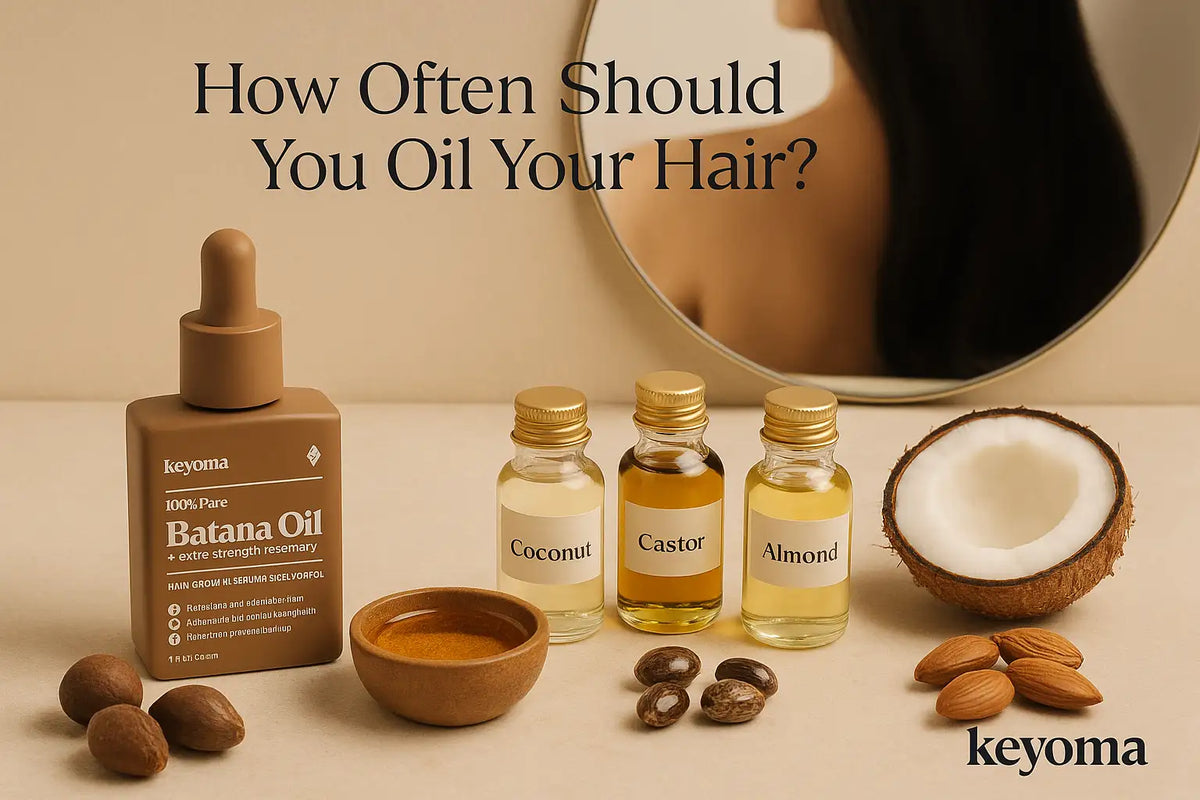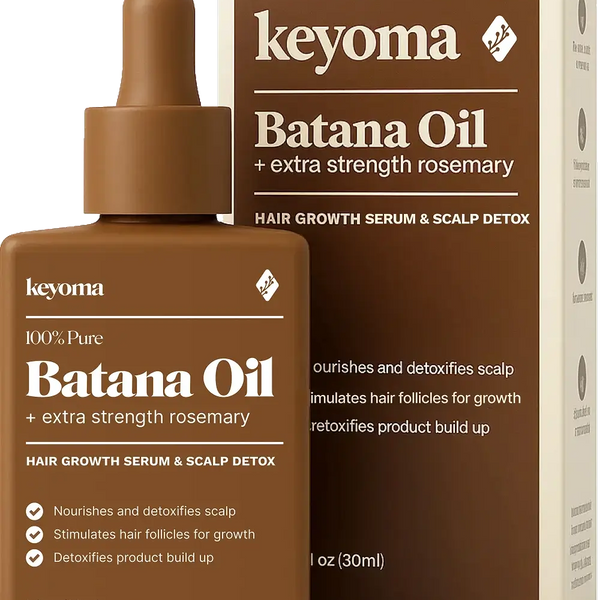In this article
Oiling your hair is a long-trusted practice that can nourish your scalp, strengthen your strands, and improve overall hair health. How often you should do it depends on your hair type, scalp condition, and personal routine.
Let me tell you what factors affect oiling frequency and get practical tips for making it a consistent part of your hair care regimen.
Key Takeaways
-
The right hair oiling frequency depends on hair type, scalp condition, lifestyle, weather, and specific hair concerns.
-
Dry or textured hair benefits from oiling two to three times weekly, while oily or fine hair needs less frequent application to avoid greasiness or heaviness.
-
Dry scalps benefit from two to three oilings per week, while oily scalps should be oiled about once weekly.
-
Active lifestyles and harsh climates call for more frequent oiling to replenish moisture and protect from damage.
-
For hair loss or dandruff, oiling two to three times a week with targeted oils (like castor, neem, or tea tree) can help.
-
Daily oiling works for very dry or damaged hair but risks buildup, while weekly oiling is easier to maintain for most hair types.
-
Nighttime oiling or at least one to two hours before washing maximizes nutrient absorption.
Why Oiling Matters for Scalp and Hair Health
Scalp oiling is different from hair oiling—which usually means applying oil to wet strands. With scalp oiling, the focus is on stimulating growth, locking in moisture, and preventing dryness or irritation. I’ve found that being consistent with scalp care is one of the best ways to keep your hair healthy from the root up.
Massaging oils like batana, castor, coconut, or almond into your scalp regularly can stop it from becoming dry or flaky. These oils sink into the cuticle, improving elasticity and preventing brittleness. They’re also rich in nutrients and antioxidants that boost blood flow, feed hair cells, and calm inflammation.
Oiling your scalp will strengthen each strand, helping it resist breakage and shielding it from damage caused by washing, pollution, or harsh weather. Most people can benefit from it, no matter their hair type or texture, but it’s especially valuable if you have natural hair.
How Often Should You Oil Your Hair

How often you oil your hair depends on several factors. Your hair type, scalp health, daily routine, and any concerns you’re trying to address. I created a simple guide to help you figure out the right frequency for your needs.
Oiling Frequency by Hair Type
Dry Hair
If your hair feels dry and brittle, try oiling it two to three times a week. Dry strands often lack natural oils, and regular treatments can restore moisture, strengthen your hair, and lower the risk of breakage.
Oily Hair
If your hair is naturally oily, like a friend of mine, once-a-week oiling is enough. From her experience, adding more leaves her scalp overly greasy, which tends to attract dirt and might even make hair fall worse. She learned it the hard way, and now, she keeps it light to maintain the balance without weighing her hair down.
Normal Hair
If your hair isn’t too dry or too oily, aim to oil it once or twice a week. This keeps your moisture levels balanced while avoiding a greasy scalp. I’ve found this routine works well for maintaining softness and shine without overdoing it.
Thin Hair
If you have fine or thin hair, oil it only once every week or two. Too much oil can weigh it down and make it look flat. Use a light hand and concentrate on the ends instead of the roots—that’s where I notice the most dryness and damage.
Textured Hair
For me, I have somewhat curly or textured hair, and I oil it two to three times a week. My hair type usually needs extra moisture to stay healthy, soft, and easy to manage. After regularly oiling my hair, it keeps my curls defined and far less prone to frizz.
Oiling Frequency by Scalp Condition
Dry Scalp
A dry scalp can cause dandruff and itching, which often leads to hair fall. Oiling two to three times a week helps keep your scalp hydrated, so you can prevent flakes and irritation while supporting healthier growth.
Oily Scalp
If your scalp produces too much sebum, stick to oiling once a week. This way, you’ll give it the nutrients it needs without making it overly greasy.
Oiling Frequency Based on Lifestyle and Weather
Active Lifestyle
If you lead an active lifestyle and sweat often, try oiling your hair two to three times a week. This helps replace the moisture and nutrients your hair loses through frequent sweating.
Harsh Weather Conditions
If you live in extreme weather—whether it’s very hot, cold, or humid—oil your hair two to three times a week. This adds a protective layer that helps shield it from environmental damage.
Oiling Frequency for Hair Concerns
Hair Loss
If you’re dealing with hair fall, try oiling your hair two to three times a week. This can strengthen your roots and help slow down shedding. Go for oils known to combat hair loss—batana, coconut, almond, or castor are my go-to choices because they nourish deeply and support healthier growth.
Dandruff
Oiling your hair two to three times a week with antifungal options like neem or tea tree oil will help you reduce dandruffs. This routine helps keep flakes in check while calming the itchiness that often comes with them.
Daily vs Weekly Hair Oiling
Before deciding how often to oil your hair, understand the difference between daily and weekly routines. The right choice depends on your hair type, scalp condition, and how your lifestyle affects both.

Daily Oiling
Daily oiling involves applying small amounts of oil to the scalp or hair every day.
Benefits:
-
Keeps moisture locked in for people with extremely dry hair or scalps.
-
Can protect hair from sun, wind, and pollution damage.
-
Helps maintain softness and manageability for very coarse or textured hair.
Disadvantages:
-
Can clog hair follicles if applied in excess, leading to irritation or breakouts.
-
May attract dirt and dust, making hair feel heavy and greasy.
-
Requires more frequent washing, which can strip natural oils if done with harsh shampoos.
Best for:
People with severely dry or damaged hair, those in harsh climates, or individuals following traditional oiling rituals that suit their scalp health.
Weekly Oiling
Weekly oiling means applying oil once or twice a week, usually as part of a pre-wash treatment.
Benefits:
-
Allows the scalp time to absorb nutrients without product buildup.
-
Supports balanced sebum production, keeping the scalp healthy.
-
Easier to maintain for busy lifestyles while still improving hair strength and shine.
Disadvantages:
-
May not provide enough hydration for extremely dry or chemically damaged hair.
-
Requires consistency to see long-term results.
Best for:
Most hair types, especially normal to oily hair, or anyone looking for a manageable routine that supports scalp health and hair growth.
Best Time to Oil Your Hair
The best time to oil your hair is at night so the nutrients can sink in while you sleep. If you can’t leave it overnight, aim for at least one to two hours before washing. When you’re active or dealing with extreme weather, applying oil before a wash also works as a protective shield for your strands.
Build Your Ideal Oiling Habit with Keyoma Batana Oil
Match your oiling schedule to your hair type, scalp needs, and daily routine. Staying consistent matters more than how much you use. Pick a pure, additive-free oil to feed your scalp and strengthen your strands naturally.
With Keyoma Batana Oil, you can oil with confidence—our 100% plant-based, cruelty-free formula supports healthy growth and keeps your scalp free from harsh ingredients. Strong, full hair starts at the roots, and a mindful routine can make all the difference.
Featured Product
100% Pure Batana Oil + Rosemary









